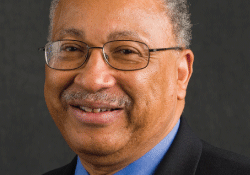-

How’s That? It Doesn’t Take a Scientist to See Through Implausible Research Hypotheses
In reviewing key findings from the social-science literature, laypeople were able to accurately predict replication success 59% of the time.
-

James S. Jackson (1944-2020)
APS James McKeen Cattell Fellow James S. Jackson, a pioneering social psychologist known for his research on race and ethnicity, racism, and health and aging among African Americans, died on September 1, 2020.
-

Tackett Named Editor of Clinical Psychological Science
APS Fellow Jennifer Tackett has been selected as the new editor of Clinical Psychological Science, to begin her tenure on January 1, 2021.
-

Healthier Eating Is Possible Even During a Pandemic, If You Simply Talk to Yourself
A technique known as “distanced self-talk” is an effective strategy for making healthier food choices.
-

Online but Fully Engaged: APS Microgrants Fund Innovative Teaching Projects
One project will compare the effectiveness of two options for asynchronous online courses: students can participate via written responses or short video responses. Another uses livestreaming from head-mounted cameras to facilitate blended lab collaboration.
-
Education and Cognitive Functioning Across the Life Span
Psychological Science in the Public Interest (Volume 21, Number 1)Read the Full Text (PDF, HTML) Education appears to affect cognitive ability, but it might not directly attenuate declines in cognition associated with aging. However, education can influence cognitive functioning in the elderly by contributing to enhanced cognitive skills that emerge in early adulthood and persist into older age. Therefore, fostering educational attainment appears to have great potential for improving cognitive ability in early adulthood and reducing public-health burdens related to cognitive aging and dementia.

